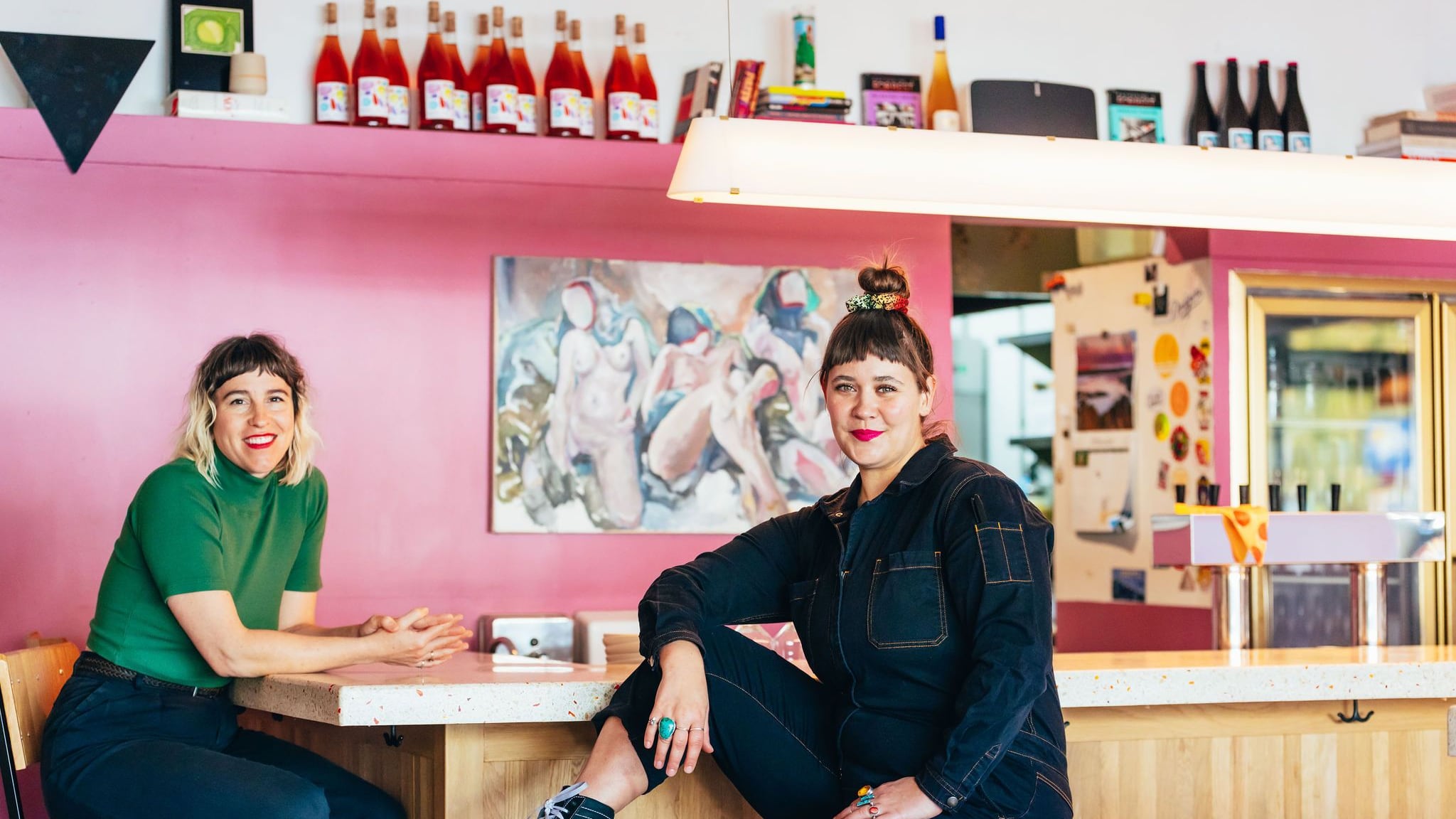When Lilly Brown visited The Ruby Fruit, it was her first time getting a drink in Los Angeles without a second thought.
Brown, a lesbian, cycled through the same questions — Where will I be welcomed? Where will I be safe? Where will there be people like me? — almost every weekend since moving from Syracuse, New York to L.A. in 2014.
That is until The Ruby Fruit, L.A.’s newest lesbian wine bar, opened its doors in February, a welcomed but overdue venture since the county’s last permanent lesbian bar (a relatively unknown, 45-year-old business that catered to an older crowd) — Oxwood Inn — closed its doors in 2017.
“We saw a lot of people we knew and people we didn’t know, and we got to meet new people,” Brown said during a phone call, referring to she and her fiancé’s first trip to The Ruby Fruit. “The coolest part was knowing that it’s always going to be there.”
Two former workers at the now-closed natural-wine bar, Eszett, opened The Ruby Fruit in its place at a Silver Lake strip mall. Following Eszett’s closure in January, Emily Bielagus and Mara Herbkersman turned the space around with the intention of creating a hangout spot for lesbian, bisexual and other queer women, trans and non-binary individuals — a direct response to the dozens of gay bars catering to queer men lining the streets of L.A. County neighborhoods such as West Hollywood.
In a serendipitous window for the L.A. queer community, another bar opened its doors the following weekend, just a few miles away in East Hollywood. Honey’s at Star Love was co-founded by Charlotte Gordon, Mo Faulk and Kate Greenberg, a trio who, like Bielagus and Herbkersman, recognized the need for a nightlife space that catered to more than just the gay-male community in L.A.
“What we’re doing is really different than what’s happening in [West Hollywood] right now,” Gordon shared in an interview at Honey’s. “What they’re doing is great, but there are a lot of folks who wouldn’t enjoy going out in the kind of brick-and-mortar bars that already exist.”

Honey’s and The Ruby Fruit offer a more stable contrast to the pop-up parties in various bars and clubs that have become the normal nightlife scene for queer non-men in L.A. Pop-up parties organized by Whitney Mixter from Showtime’s “The Real L Word” and other queer female big names were the only places Brown was able to connect with gay women in the area when she first moved to L.A.
“I was following certain people on Instagram, and that’s how I found the parties,” Brown said. “I would go to those with one of my straight friends because I didn’t know any queer people here yet. It was a bit hard to meet people at the beginning.”
Once Brown learned how to navigate the flash-party scene, she co-organized her own activity-focused social event, Queer Field Day, for LGBTQ+ women and trans individuals. But the pop-up system never felt reliable, a fear that manifested with the broken promise of creating a permanent bar made by Hot Donna’s Clubhouse.

Hot Donna’s parties were the face of queer women and trans pop-up events coming out of early lockdowns caused by the COVID-19 pandemic. Organizer Lauren Richer hosted Hot Donna’s Clubhouse touring events to finance the opening of a permanent lesbian bar of the same name. According to Brown, who once organized a pop-up party with Richer, these events were well attended. Richer, in 2021, even told the L.A. Times she had already raised more than $20,000 to open the bar.
Unexpectedly in June 2022, Hot Donna’s announced on Instagram it would be taking a hiatus from hosting pop-up events, and the organization deactivated its social media accounts. More than six silent months later, Brown says she reached out to Richer about what progress she had made toward opening the bar and was met with no response.
Less than a day after Brown posted a TikTok video explaining what had happened when she reached out, Hot Donna’s Clubhouse reactivated its Instagram account, and posted an apology message regarding its silence, stating, in part:
“The truth is simply that the business model we built around the brick-and-mortar bar proved itself to not be viable.” The message continued, “We are here to cheer on anyone who pursues the great task of creating queer safe spaces in Los Angeles.”
“It’s all been very ephemeral until now,” said Lily Bellinghausen, a queer woman who’s lived in L.A. for five years. Bellinghausen, on a busy Tuesday night at The Ruby Fruit, said she’d eagerly visited the new lesbian bar two other times already, including on opening night.
“The place was packed,” Bellinghausen said. “We were overflowing into the parking lot.”
The pandemic was an isolating experience for Bellinghausen. Finding a community was difficult for her without a constant place to build connections with other queer women and gender-nonconforming people of varying ages.
“That’s what I love about [The Ruby Fruit],” Bellinghausen said. “It’s bridging gaps between generations.”
According to The Lesbian Bar Project, a campaign launched in October 2020 to raise awareness about the disappearance of lesbian bars across the country, only 27 lesbian bars remain open in the United States. That number is down from roughly 200 bars in 1980, likely due to demographic changes, the wage gap and other city-specific reasons, among other factors.
Brown believes that fighting this decline by opening modern queer-inclusive spaces such as Honey’s and lesbian bars such as The Ruby Fruit is essential to building confidence in L.A.’s queer-woman, transgender and non-binary community.
“I think a lot of people might wonder why lesbians only hang out with lesbians,” she said. “We’re hanging out with lesbians because they relate to us in ways that straight people don’t. That gay men don’t. We get each other’s ‘L-Word’ references, and we make each other feel safe. Things like that matter.”
